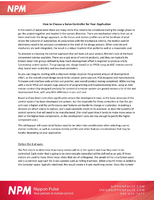Scarf Monitoring System uses phased array technology.
Share:
Press Release Summary:
Weld profile visualization system delivers online, real-time picture of scarfed ERW pipe IDs and ODs during manufacturing process. By identifying events such as tool drift and edging as they occur, system makes it is possible to affect real-time control of scarfing process and reduce scrap. Ultrasonic phased array transducer electronically simulates scanning action required to provide weld profile information, and resulting information is fed into UTxx digital flaw detection platform.
Original Press Release:
New Phased Array Scarf Monitoring System from GE
Billerica, Mass. - April 10, 2008. - GE Sensing & Inspection Technologies has introduced a weld profile visualization system using phased array technology. The new scarf monitoring system provides a real time, online, accurate picture of both the inside diameter (ID) and the outside diameter (OD) profiles of scarfed ERW pipes during the manufacturing process. As a result, it is possible to affect real time control of the scarfing process by identifying events such as tool drift and edging as they occur. This can achieve significant reductions in scrap.
Scarfing is a process used in pipeline manufacture that moves a smoothing tool along the weld as it is made. This tool follows the electric arc welding machine and smoothes the surface of the weld on both the ID and OD. The tool may get worn or slip, resulting in roughness of the weld surface. These surface defects could affect the subsequent flow of any fluid in the pipe or could provide a point of weakness. The scarf monitoring system follows this tool and identifies any surface faults virtually immediately so that corrective action can be taken and minimum pipe length is lost.
The heart of the new system is the ultrasonic phased array transducer, which electronically simulates the scanning action required to provide the weld profile information. The resulting information is then fed into GE's field-proven UTxx digital flaw detection platform. This incorporates standard or phased array flaw detection channels and all the associated processing electronics to give a complete scarf monitoring and flaw inspection package.
In operation, the transducer test head assembly is mounted such that it is directly above the weld line. The mill coolant acts as the ultrasonic coupling medium. The transducer test head then uses its phased array elements to monitor the inside and outside diameter of the weld as it is being cut, at a scanning rate of up to 300 profiles/sec. Transducers and shoes are available to monitor tubes from 50 up to 500mm in diameter and typical coverage is ±25mm from the nominal weld center line.
Inspection data is displayed in true-to-scale cross-sectional profile at one or multiple monitor screens and high and low limit alarms provide warning of weld profile deviation. Intelligent dynamic software averaging techniques minimize the possibility of false readings.
The weld profile visualization system features all-electronic set-up for ease of use and repeatability and it can be installed within feet of the weld station, depending on local temperature conditions. As a result, it operates both as a process control system as well as a quality control system. It can be combined with a flaw detection system and it allows inspection traceability through a built-in data logger, which records minimum and maximum thickness readings across the weld area and strip thickness.
o Learn more about Scarf
o Download Scarf image (281KB)
About GE Sensing & Inspection Technologies
GE Sensing & Inspection Technologies is part of GE Enterprise Solutions, a $5 billion business helping customers compete and win in a changing global environment by combining the power of GE's unique expertise and intelligent technology to drive customers' productivity and profitability. GE Sensing & Inspection Technologies is a leading innovator in advanced measurement, sensor-based and inspection solutions that deliver accuracy, productivity and safety to its customers. The company designs and manufactures sensing instruments that measure temperature, pressure, moisture, gas and flow rate for demanding customer applications. It also designs, manufactures and services inspection equipment, including radiographic, ultrasonic, remote visual and eddy current, that monitors and tests materials without disassembly, deforming or damaging them. GE Sensing & Inspection's products are used in a wide range of industries, including oil & gas, power generation, aerospace, transportation and healthcare. The company has 4,700 employees at more than 40 facilities in 25 countries worldwide.




